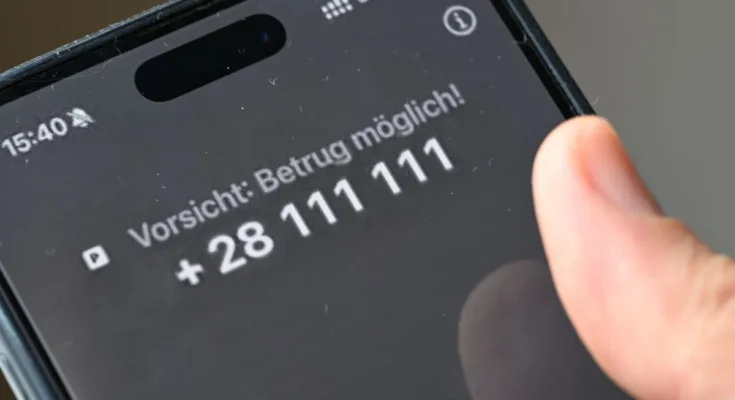Anti-spam system
Vodafone warns against fraudulent calls
Updated 11/15/2025 – 16:41Reading time: 3 minutes

It’s ringing, an unfamiliar number on the phone is unknown – will you answer it? If so, there may be someone who doubts it. Cell phone providers urge caution.
“Attention: possible fraud!” This warning has appeared on millions of smartphones in Germany since the end of April. Behind this there is a protection mechanism from the mobile phone provider Vodafone. Between April and mid-November this year, the company recorded a total of about 41 million incoming call alerts. The purpose of this action: Users should be warned about suspicious numbers and, in the best case, not answer the phone at all.
There are an average of 210,000 warning messages per day, according to Vodafone. And the numbers are increasing. Foreign numbers are often affected, but calls with German area codes can also be considered fraudulent. Most of those contacted reacted cautiously: only about twelve percent accepted the call.
For comparison: According to Vodafone, the acceptance rate for anonymous calls – that is, calls that do not display a number – is around 60 percent. This shows that the warning on the screen has an impact and is known to many people.
The technology behind this warning message is based on a database where Vodafone stores suspicious phone numbers. These figures are reported to the company by those affected, among others. However the system cannot guarantee full protection. Since fraudsters often change their phone numbers, it is possible that the calls are not immediately classified as suspicious – and in such cases there is no warning.
Not only annoying advertising calls are recorded in the database. The numbers behind hidden criminal intentions are also stored. The purpose of the call is often to ask for personal information such as date of birth or account number – or even to persuade the person called to hand over money.
According to Vodafone Germany boss Marcel de Groot, the technology is an effective safeguard, but not enough: “In everyday life, we have to pay close attention to who we are dealing with at the other end of the phone.” Increased vigilance is urgently needed in the run-up to Christmas, de Groot said. Experience shows that it is precisely in this phase that there are more telephone fraud attempts. The advice: Don’t reveal any personal information and always ignore suspicious calls or messages.
It’s not just Vodafone customers who benefit from this alert function. Users of providers such as 1&1 who make calls over Vodafone’s network are also automatically protected, according to the group. This is made possible by so-called national roaming contracts, through which customers can access Vodafone’s mobile network.



